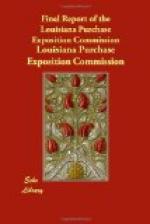by every branch of the Government against Mr.
Jefferson’s original opinion and in favor of
the nation’s power to acquire territory,
as was done under the treaty of 1803, and considering
the fact that we have since that time immensely
increased our area by the acquisition, not only of
neighboring territory, but of distant islands of the
sea, separated by thousands of miles from our
home domain, we may be inclined to think lightly
of President Jefferson’s scruples concerning
the acquisition of lands, not only next adjacent to
us, but indisputably necessary to our peace and
development.
There were wise men near our President in 1803 who differed with him touching the nation’s power to acquire new territory under the original provisions of the Constitution; and these men did not fail to make known their dissent. Moreover, in the Senate, to which the treaty was submitted for confirmation, there was an able discussion of its constitutional validity and effectiveness. The judgment of that body on this phase of the subject was emphatically declared, when out of 31 votes 24 were cast in favor of confirmation. An amendment to the Constitution was afterwards presented to Congress, but its first appearance was its last. It does not appear that the President interested himself in its fate, and it died at the moment of introduction.
While in this day and generation we may wonder at the doubts which so perplexed Jefferson in 1803 and at his estimate of the limitation of our fundamental law, and may be startled when we reflect that if they had been allowed to control his action we might have lost the greatest national opportunity which has been presented to our people since the adoption of the Constitution, we can not fail at the same time to be profoundly grateful that these doubts and this estimate were those of a man sincere enough and patriotic enough to listen to wise and able counselors and to give his country the benefit of his admission of the fallibility of his judgment.
Thomas Jefferson never furnished better evidence of his greatness than when, just before the submission of the treaty to the Senate, he wrote to a distinguished Senator who differed with him on this question: “I confess that I think it important in the present case to set an example against broad construction by appealing for new power to the people. If, however, our friends shall think differently, certainly I shall acquiesce with satisfaction, confiding that the good sense of our country will correct the evil of construction when it shall produce ill effects.”
A recent writer on American diplomacy, who is not suspected of partiality for Jeffersonian political doctrine, gave in strong and graceful terms a good reason for our gratitude to-day, when, in referring to this subject, he wrote: “It was fortunate for the future of America that we had at the head of affairs a man of such broad




